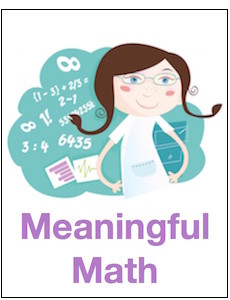The Cost of Trying to “Cover the Material”
A MiddleWeb Blog
 I’m writing this on our last day of school before Christmas break. If I’m being honest, I am completely stressed out.
I’m writing this on our last day of school before Christmas break. If I’m being honest, I am completely stressed out.
By the time you read this, maybe we’ll all be feeling a little more relaxed.
Mid-school year is always stressful. This year the stress came from constantly feeling like I was falling further and further behind in all of my lesson plans. I was falling behind for all the usual reasons: early release days for weather (tornado and snow), student illnesses, family illness, field trips and a million other things.
I became increasingly stressed out trying to figure out how to “cover” all the material before the end of the semester. I don’t know about everyone else, but when I’m trying to figure how to get it all in, I’m prone to developing tunnel vision.
This year I became so laser focused on covering all the material that I didn’t think about anything else. I spent a lot of one-on-one time with my calendar furiously marking out some things and rearranging others just to see if I could get it all in. Does anyone else do this?
Toward the end of the semester I was feeling pretty good about getting all (or most) of my material in – when I looked out at my classroom and the whole class looked sad.
They were paying attention but there was literally no joy in the room. Honestly, I felt the same way. I knew I needed to course-correct, so I went to the desk and got my stamper and walked around the room and stamped every paper where a student was working and said thank you for working. (My students love stamps; I’m not sure why).
That got me a few smiles from students. Even better I took a few minutes to talk with them about non-math topics. I can’t remember what we talked about, but I can remember feeling some of the stress leave the room.

Typically when I plan a lesson, I try to have a variety of learning experiences for my students: an interesting introduction, student discovery, independent work, partner work, card sorts, technology, even games if applicable.
What is my classroom like when I’m trying to “cover” material? It’s a lot of me at the board and my students taking notes, very little interaction, mostly students are just passively listening. That’s not good teaching, and it’s not fair to my students or me. To adjust for missed or shortened classes, I had changed my teaching practices.
Well, I’m determined to stop repeating this particular mistake. As a reminder for myself, I made a list of the reasons why “covering” material is a bad idea.
“Covering” Material is not Good Teaching
- Students can only absorb so much new material. Rushing through to just “cover” it all isn’t effective teaching.
- I’m not in control of people’s health, the weather, or most of the things that happen to interrupt my class, and always rushing to catch up is robbing me and my students of a pleasant learning experience.
- Teaching to my standards is important, but covering material is not the reason I became a teacher.
All that said, it’s also important to realize that classes will be cancelled – there has never been a year when it hasn’t happened – and I need a realistic plan to counter the mid-year panic. So I’ve come up with a few suggestions for myself when the inevitable happens, instead of reverting back to me at the board “covering” material.
What to do instead
- Reread the standards to make sure I am teaching what I am supposed be to teaching and not adding more additional content than I can cope with.
- Be realistic when planning: Interruptions will happen so plan accordingly.
- Instead of using class time to review tests, allow students to come to my room during advisement period to review their tests.
- Combine standards when possible; sometimes you can kill two birds with one stone without sacrificing learning.
- Remember: Learning that sticks – and an enjoyable classroom environment – are my priorities, not ticking off standards in my lesson planner.
They say the first step toward recovery is to admit you have a problem. Well I have a problem. And next semester will not be any easier. We will be giving the ACT in March, and we really need our students to do well. So in addition to covering our curriculum, we will be preparing our students for the ACT.
I am really going to need to reread this column before school starts back in January! And probably in February and in March! Above all, I am going to have to remind myself that good teaching practices and joy in the classroom should always come first.


































Totally agree with you Michelle. Thank you for sharing!